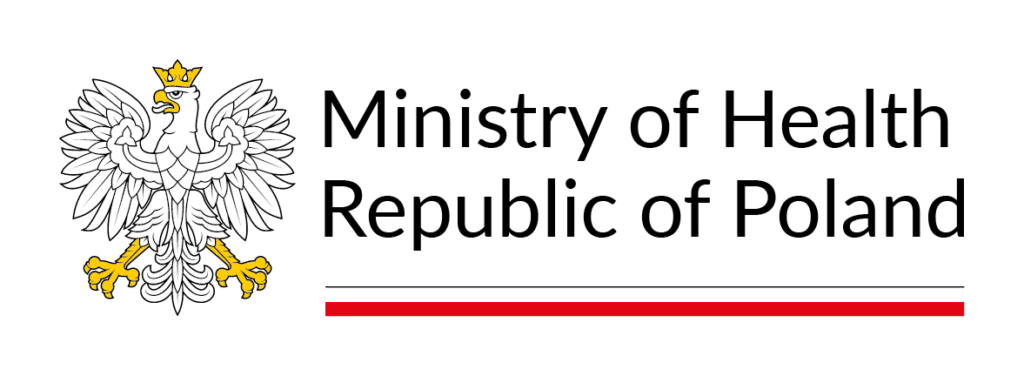„Towards the National Platform for Genomic Surveillance”
PLEpiSeq is a newly built IT platform for analyzing, storing and sharing data from full-genome sequencing of pathogens (WGS) developed for the needs of national epidemiological surveillance.
At this stage, the platform will include SARS-CoV-2, influenza A and B viruses, RSV, Salmonella, Campylobacter and Escherichia.
The primary objective of the platform is to support routine epidemiological surveillance, including epidemiological investigations using advanced WGS analyses. It will also enable the study of the general genomics of selected pathogens in order to determine their pathogenic potential, resistance to antibiotics or antiviral drugs.
The platform is being developed for laboratories operating in the field of public health. It is addressed to laboratories that have already implemented WGS, as well as those that would like to build their potential in this area.
PLEpiSeq will offer user-friendly solutions to:
- access to the results of advanced bioinformatics analyses and visualizations
- manage and store WGS data and relevant metadata in a single repository
- quickly share WGS data with other users and upload it to ECDC and other public repositories

PLEpiSeq project „Towards the National Platform for Genomic Surveillance” is co-financed by the European Union and the Ministry of Health of Poland.
HADEA project no. 101113409
Project time frame: 01.10.2022 – 31.12. 2025 (duration 39 months)
Total eligible cost: 2 485 824,00 EUR (100%)
Support from UE: 1 988 659,00 EUR (80%)
Beneficiary contribution: 497 165,00 EUR/ 2 316 242,02 PLN (20%)
Ministry of Health support to the Beneficiary: 2 088 200,00 PLN (90% of the Beneficiary contribution)
PLEpiSeq is a continuation of the HERA project “Enhancing Whole Genome Sequencing (WGS) and/or Reverse Transcription Polymerase Chain Reaction (RT-PCR) National Infrastructures and Capacities to respond to the COVID-19 pandemic in the European Union and European Economic Area” carried out in 2021-2022. The HERA project, co-funded by the European Centre for Disease Prevention and Control (ECDC) and the Ministry of Health of Poland, aimed to support the State Sanitary Inspection to introduce genomic surveillance of circulating and emerging SARS-CoV-2 variants.
The ongoing project includes priority pathogens such as influenza A and B viruses, RSV and Salmonella, Campylobacter and Escherichia, which are to be included in genomic surveillance under the ‘ECDC strategic framework for the integration of molecular and genomic typing into European surveillance and multi-country outbreak investigations’.
The project’s objectives are in line with the mainstream development of European epidemiological surveillance of infectious diseases and infections, involving the wider use of whole-genome sequencing in routine epidemiological surveillance. The implementation of the project will provide tools for more effective and faster identification of epidemic outbreaks and changes in genetic variants of pathogens circulating in Poland. By enhancing WGS’s national capacity in the area of public health, the country’s preparedness to respond to future emergencies, including cross-border threats, is strengthened. PLEpiSeq will not only make it possible to prevent the spread of infectious diseases more effectively, but will also provide the necessary information for effective prevention, such as adapting influenza or COVID-19 vaccinations to the virus variants that predominate in a given epidemic season.
Project goals
The main objective of the project is to be a cornerstone for the long-term development of genomic surveillance in Poland by developing a platform supporting whole-genome pathogen sequencing (WGS). The platform will be adapted to the needs of national epidemiological surveillance.
Whole-genome sequencing (WGS) is an essential tool to strengthen epidemiological surveillance and response to infectious disease threats, as demonstrated by the COVID-19 pandemic. Not only has it accelerated the implementation of genomic surveillance of SARS-CoV-2, but it has highlighted a number of challenges related to the further integration of WGS into routine epidemiological surveillance. Among them there are:
- difficulties related to the storage and sharing of WGS data
- missing metadata standard
- lack of an agreed and standardised approach to WGS analysis
- limited access to bioinformatics tools for rapid analysis and interpretation of WGS data
- staff shortages, in particular staff skilled in the analysis and interpretation of WGS data
As part of the project, a number of activities are carried out to eliminate the above barriers, which today often prevent the effective use of the potential of WGS in epidemiological surveillance. The major activities have been described below.
The PLEpiSeq project includes 9 work packages (WP1-9), four of which are management and promotion (WP1-4). On the other hand, as part of WP5-9 activities, the main objectives and assumptions of the project are implemented, which are important for the final recipients of the project:

WP5 Expansion of the software infrastructure
Enable easy management, storage and storage of WGS data (including metadata) for project pathogens in a single repository, as well as easy upload and sharing.

WP6 Genomic Sequence Data and Metadata Integration
Leveraging the potential of WGS in routine surveillance to improve outbreak detection, threat response and source identification.

WP7 Standardization of Laboratory Protocols
Development, implementation and optimization of WGS sequencing protocols for pathogens covered by the project.

WP8 Development of Bioinformatics Tools
Development of automated tools for advanced bioinformatics analyses and visualisations for the project’s pathogen.

WP9 Outreach, Support, Education
development of human resources in the field of “wet” laboratory and bioinformatics analysis and interpretation of WGS data.
The project is implemented by the National Institute of Public Health of the National Institute of Hygiene – National Research Institute in Warsaw.
The main target groups of the project are: the State Sanitary Inspectorate; WGS “wet” laboratories, diagnostic laboratories conducting research for infectious diseases, scientific institutes, universities, the Ministry of Health and State Sanitary Inspection.
Steering Committee
Supervision over the implementation of the tasks of the PLEpiSeq project is exercised by the Steering Committee, which includes, among others, representatives of the Ministry of Health and the Chief of State Sanitary Inspection. The Steering Committee is chaired by the Director of the National Institute of Public Health, National Institute of Hygiene – National Research Institute in Warsaw.


“Towards the National Platform for Genomic Surveillance” – Project 101113409 – PLEpiSeq co-financed by the European Union under the EU4H Project Grants and the Ministry of Health.
Views and opinions expressed are however those of the author(s) only and do not necessarily reflect those of the European Union. Neither the European Union nor the granting authority can be held responsible for them.
